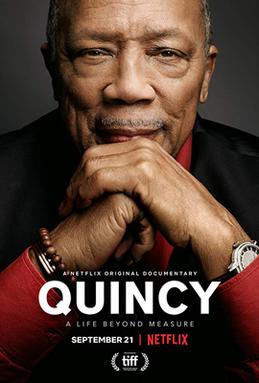Difference between revisions of "Quincy (2018)"
Skalexsong (talk | contribs) (Created page with "'''''Quincy''''' (2018) is an American documentary movie about the life of a Black American record producer, singer and film producer Quincy Jones. The movie was released by N...") |
Skalexsong (talk | contribs) |
||
| Line 14: | Line 14: | ||
<br /> | <br /> | ||
==Reference== | ==Reference== | ||
| + | [[Category:Black Racism in Documentary Movies]] | ||
| + | [[Category:Anti Black Racism in Documentary Movies]] | ||
Revision as of 09:28, 1 January 2021
Quincy (2018) is an American documentary movie about the life of a Black American record producer, singer and film producer Quincy Jones. The movie was released by Netflix on September 21, 2018.[1]
Contents
Plot
An intimate look into the life of icon Quincy Jones. A unique force in music and popular culture for 70 years, Jones has transcended racial and cultural boundaries; his story is inextricably woven into the fabric of America.[2]
Empowerment
One of pop music’s most gifted black producers, Quincy Jones, this documentary on his life’s work offers a personalized glimpse into a bygone world of entertainment and the legacy of racism that black artists still grapple with today. [3]
The movie shows when he’s singled out onstage by Frank Sinatra, serving as the Chairman’s twentysomething arranger in the mid-’60s. Follows him poring over film reels and jotting down melodies as he makes a name for himself as a film composer, becoming one of the first black musicians to do so. It also shows him in the studio with Jackson, whose astronomical solo success under Jones’ auspices turned the already-plenty-famous producer into a genuine international celebrity.[4]
Controversy
On the documentary, Jones is also open about the racism he faced on the road, like when he played a town which had recently lynched a black man before Jones and his men arrived—they relied on their white bus driver to get food, as black men were unable to enter restaurants. Film composer Henry Mancini recalls a time as well when a movie producer reached out to him to see if Mancini would recommend hiring Jones for a potential project. The producer was unsure of whether or not black people could score movies. [3]
